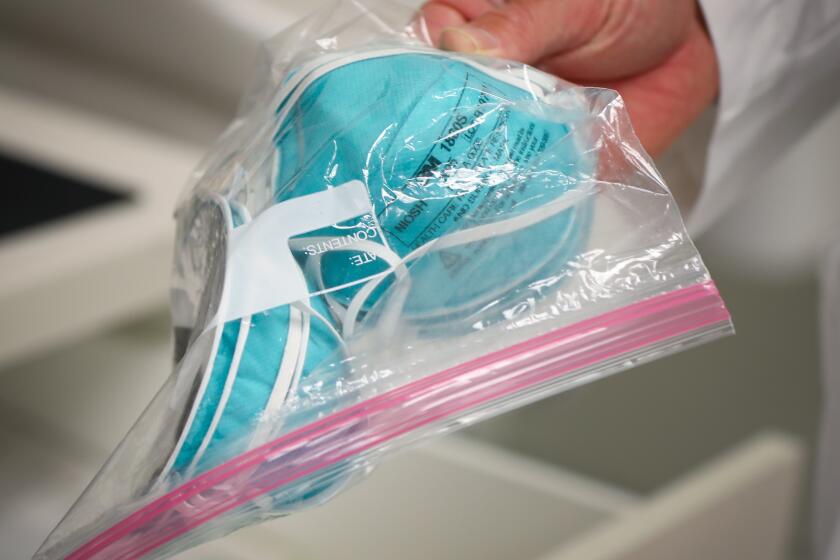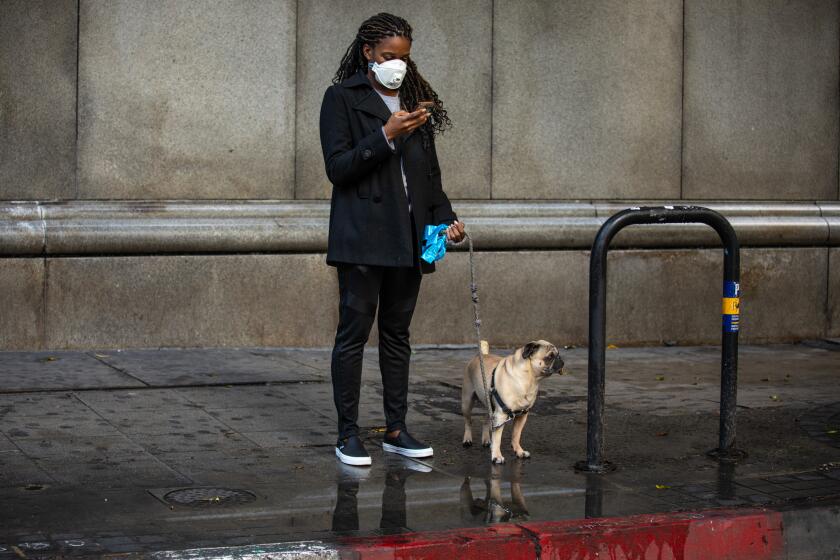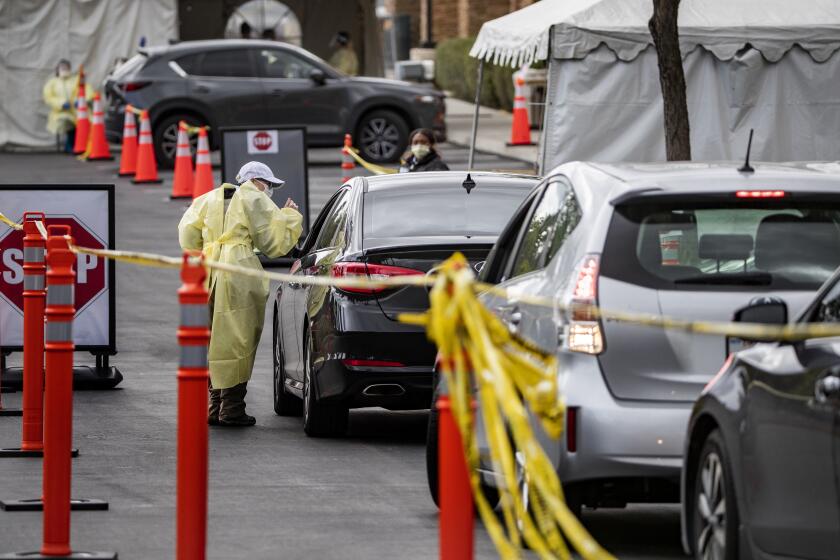Sick as a dog, Kathy Griffin hit the ER with coronavirus concerns. Here’s what happened
Kathy Griffin might have been exposed to the coronavirus. Or she might not have. After a recent trip to urgent care and the emergency room while gravely ill, the comic wasn’t able to get tested.
Griffin has an abdominal infection that is being treated with medication, though she won’t know whether she’s turned the corner for a couple of days, she told The Times in a phone interview Wednesday afternoon. She’s back home, and she’s not going out anytime soon.
The public likely wouldn’t have known about her illness at all had President Trump not tweeted a claim Wednesday that the U.S. had outpaced South Korea in COVID-19 testing. Griffin, who had just come home from an emergency room the day before, just had to comment, because what the president was saying didn’t match with what she had experienced.
Sign up for our free Coronavirus Today newsletter
We’ll bring you the latest news, our best stories and what they mean for you — plus answer your burning COVID-19 questions.
“I was sent to the #COVID19 isolation ward room in a major hospital ER from a separate urgent care facility after showing UNBEARABLY PAINFUL symptoms,” Griffin wrote on Twitter after she accused Trump of lying. She said she couldn’t get tested because of “CDC (Pence task force) restrictions.”
With that response, the 59-year-old posted a couple of alarming photos showing her in a mask, in a hospital bed, in what appeared to be a sealed hospital room. Soon her name was trending on social media.
What happened? On Saturday, Griffin started having what her husband, Randy Bick, described as “mild stomach issues.” But then they receded, he said. Temporarily.
“Two days later,” Bick said also by phone, “she woke up very early in the morning and had incredibly intense pain, vomiting, diarrhea, every 20 minutes. Just really sick.”
“The vomiting felt like a convulsion,” Griffin said.
And about a week prior, the couple had traveled internationally.
“We were both nervous because we were still in the incubation period after returning from Mexico, but also we had not left the house in days,” Griffin said. “We’d been hearing about a 14-day incubation period [for the coronavirus]. So for me to get what felt like food poisoning after six days, I thought, OK, is this a coincidence or what?”
They’d been self-quarantined since returning home mid-March. After a phone consult with her doctor, she took his advice and went to an urgent care.
“We both put on N-95 masks and gloves and I drove her down there,” Bick said. “We got to the front and immediately there was a security officer and some nurses’ assistants outside.” Once inside, Griffin was hooked up to an IV and got a shot for her abdominal pain, which was considerable. But she was still vomiting frequently, so they sent her along to the Cedars-Sinai emergency room.
“I remember vividly the doctor telling me ... ‘I’m going to send you to Cedars ER today because I don’t think I could get you in 13 days from now,’” Griffin said. She was freaked out.

The emergency department setup these days at Cedars-Sinai Medical Center is different than usual: There are tents outside where staff see low-risk COVID-19 patients. Patients seen there are mostly well and discharged home, a Cedars spokesman said via email.
Then there’s a specific COVID-19 area in the emergency department where staffers see patients who are sicker and may require more testing or hospitalization. That’s where Griffin was.
“In all locations, patients wear masks and are isolated, and/or there is a six-foot distance maintained between them,”the spokesman said.
Griffin, who had a mask on in the picture she posted, said she was surprised by the personal protective equipment she saw — or didn’t see — on the health-care staff around her. One doctor had a plastic visor-style face guard, she said. Some people had masks; others didn’t. The types of masks varied.
As personal-safety guidelines are weakened amid a global supply shortage, doctors and nurses worry about their own health.
“Frankly, when they said the corona ward, I thought I would be walking into the white suits with blue-taped ceilings, everything,” she said. “I kind of expected them to put me in a shower room and all that — but as recently as [Tuesday], there’s no cavalry that’s coming in handing out millions of [test] swabs.”
She said she also saw a bunch of “really smart, incredibly brave people” who cared deeply about what they were doing. Griffin said she kept telling everyone they were heroes. She couldn’t praise the health-care workers enough.
Griffin wound up getting a chest X-ray that showed clear lungs and an abdominal CT scan that revealed the infection. Her temperature was around normal. But nausea and diarrhea, along with the severe chills and sore throat she had, are all COVID-19 symptoms. The urgent-care doctor told her she should get tested. And the ER doctor seemed to want to test both Griffin and her husband but could not, the comic said.
“The doctor was going through the boxes and going through the boxes [on a form] and she kept saying, like, ‘Ugh, because of the lungs, the fever and the kind of cough ... you don’t meet the CDC requirements,’” Griffin said. She was given the option to be admitted to the hospital, where she might be more likely to get tested, but after consulting with a few health-care staffers decided she’d be better off self-isolating at home.
So much for those stories about celebrities being able to buy a coronavirus test whenever they want one.
Coronavirus cases are growing at a rapid pace in California, but the state still lacks enough testing capacity to fully understand the virus’ spread.
“The realization when they told me the guidelines was, ‘Wow ... I now know not to come back unless my lungs are full with what feels like pieces of shattered mirror, unless I can’t breathe and unless my fever is 103 ...,’” Griffin said. “They’re not making the rules at all. That’s a frightening feeling.
“I just think it’s so obvious that those tests have to be accessible to everybody,” Griffin said in a tired voice. “A lot of people, when they hear the president saying everyone who needs a test should get one, they shouldn’t have to then go to a hospital where, frankly, they may be exposing themselves or exposing others.
“Hopefully sooner than later you can either go to a pharmacy and get one or they could deliver one at home, something like that.”
Of course, this isn’t the first time Griffin has tangled with the president. Their disputes go back to that day in 2017 when a picture of her raising a rubber replica of Trump’s severed head covered with ketchup “blood” went viral — and nearly ruined her career. She had apologized for the gag almost immediately, then retracted her apology a year later. To say there is no love lost between Griffin and Trump is to understate a very public feud.
The comedian angered Hollywood and the right with a bloody Trump photo. Armed with a new doc, she’s staging a comeback
But the testing problem might not be entirely with the federal government: California has been lagging behind New York and other hot-spot states when it comes to coronavirus testing.
By Sunday afternoon, approximately 26,400 tests had been conducted on California’s 40 million residents, according to the state’s official tally. In contrast, New York had about 78,000 tests done as of Monday.
“We are cobbling together various approaches,” Susan Butler-Wu, an associate professor of clinical pathology at USC’s Keck School of Medicine and a director of a clinical microbiology lab in L.A., told The Times earlier this week. “The whole thing is badly discombobulated. ... I think 100% that the system is broken.”
Griffin can vouch for that. Despite going to the ER with a slew of symptoms, she said she still has no idea whether she’s positive or negative for the novel coronavirus. Only time and testing will tell.
“I just don’t have an answer. I don’t know,” she said. “Someone at Cedars said to me, we cannot give you this test because of the CDC guidelines. I’m suggesting that the guidelines are still too strict because they don’t have enough tests.”
A warning on the CDC website on Wednesday read, “While supplies of these tests are increasing, it may still be difficult to find a place to get tested.”
California’s official numbers show its coronavirus testing rate is well behind New York and other states where the virus has hit hardest.
Griffin also didn’t get an answer to another important question, she said: Did her infection make her more vulnerable to the coronavirus?
“An active gastrointestinal infection, like any other infection, takes a toll on the body’s immune system, which may leave a person vulnerable to other types of infection, including COVID-19,” said Dr. John Lipham, division chief of upper gastrointestinal and general surgery at Keck Medicine of USC, in an email Wednesday.
“However, the 2019 novel coronavirus is still very new, and more research is needed before we can conclusively determine how the virus impacts people with different underlying conditions. The best thing for people to do is to follow social distancing recommendations, wash their hands frequently, and self-isolating when they feel sick or may have been exposed to the virus.”
As of Thursday morning, the CDC was reporting 68,440 coronavirus cases in the United States and 994 deaths.
More to Read
The biggest entertainment stories
Get our big stories about Hollywood, film, television, music, arts, culture and more right in your inbox as soon as they publish.
You may occasionally receive promotional content from the Los Angeles Times.














